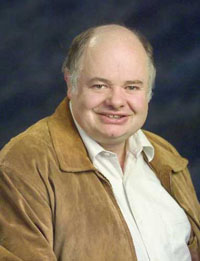 |
Lorenz T. Biegler
Carnegie Mellon University
Hougen Visiting Professor
Lorenz T. Biegler is the Bayer Professor of Chemical Engineering at Carnegie Mellon University, which he joined after receiving his Ph.D. in chemical engineering from the University of Wisconsin-Madison in 1981. His research interests lie in computer aided process engineering (CAPE) and include flowsheet optimization, optimization of systems of differential and algebraic equations, reactor network synthesis, and algorithms for constrained, nonlinear process control. Professor Biegler has been a visiting scholar at Northwestern University, a scientist-in-residence at Argonne National Laboratory, a Distinguished Faculty Visitor at the University of Alberta and at Zhejiang University, a Gambrinus Fellow at the University of Dortmund, a Fulbright Fellow at the University of Heidelberg and a Distinguished Jubilee Lecturer at IIT-Bombay. He has authored or co-authored over 250 archival publications, authored or edited nine books and given numerous invited presentations at national and international conferences.
He is the recipient of numerous awards including the Lewis Award, McAfee Award (Pittsburgh Section) and the Computers in Chemical Engineering Award, all given by AIChE, Curtis McGraw Research Award and CACHE Computing Award, given by ASEE, and the Presidential Young Investigator Award from the National Science Foundation. He is a fellow of the American Institute of Chemical Engineers and a member of SIAM, ACS and Sigma Xi. In addition, Professor Biegler has been an active consultant on process design and optimization strategies for the chemical and process industry.
Hougen Lectures, Fall 2009
ADVANCED NONLINEAR PROGRAMMING METHODS FOR CHEMICAL PROCESS OPTIMIZATION
Tuesday, September 22, at 4:00 p.m. (refreshments at 3:45 p.m.)
Room 1610 Engineering Hall
Optimization formulations play a key part in many aspects of chemical process engineering. Moreover, recent advances in nonlinear programming, including complementarity formulations and extensions of large-scale barrier methods, have led to the solution of nonlinear process optimization problems with several million variables and constraints. On the other hand, with the incorporation of more accurate and complex process models that comprise multiple time and length scales, a number of important algorithmic challenges must be addressed to deal with these optimization models efficiently.
This talk presents an overview of problem classes in chemical process optimization and discusses key characteristics of process models over multiple scales, ranging from open-form, declarative models that arise in real-time process optimization to "black-box" models that characterize molecular simulations. For this spectrum of models, a multi-scale hierarchy of optimization formulations and algorithms is explored. Here, an important challenge is to integrate these heterogeneous models within a single optimization framework. The resulting approach is illustrated with a number of case studies drawn from fuel cell systems, integrated gasification combined cycle (IGCC) power plants, and on-line optimization of polymer processes.
